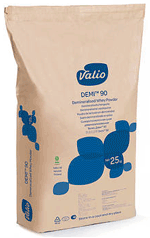Valio to replace BRC certificates with ISO 22000
- Like
- Digg
- Del
- Tumblr
- VKontakte
- Buffer
- Love This
- Odnoklassniki
- Meneame
- Blogger
- Amazon
- Yahoo Mail
- Gmail
- AOL
- Newsvine
- HackerNews
- Evernote
- MySpace
- Mail.ru
- Viadeo
- Line
- Comments
- Yummly
- SMS
- Viber
- Telegram
- Subscribe
- Skype
- Facebook Messenger
- Kakao
- LiveJournal
- Yammer
- Edgar
- Fintel
- Mix
- Instapaper
- Copy Link
Posted: 14 April 2011 | Valio | No comments yet
Valio’s four BRC certified production plants will switch to the ISO 22000 standard and its applicable technical specifications once the BRC certificates expire…
Valio’s four BRC certified production plants will switch to the ISO 22000 standard and its applicable technical specifications once the BRC certificates expire...
Valio’s four BRC (British Retail Consortium) certified production plants will switch to the ISO 22000 standard and its applicable technical specifications once the BRC certificates expire.


Valio’s Lapinlahti plant supplies Valio DEMI™ whey powders to international baby food producers and Valio Zero Lactose™ milk powder to international producers of lactose free foods.
A fifth Valio plant will also adopt ISO 22000 at that time.
The plants and production lines involved are milk powder production at Seinäjoki, cheese at Toholampi, cheese and powdered ingredients at Lapinlahti, hard cheeses at Joensuu, and starters in the Tikkurila plant in Vantaa near Helsinki.
Valio customers have approved the transfer to the ISO 22000 standard and the ISO/TS 22002 technical specifications that supplement it. Major international food industry companies drew up the ISO 22000 supplementary document, which specifies the content of the operators’ food safety support programmes.
In 2010, the document, originally known as PAS 220, was included in the International Organization for Standardization (ISO) document catalogue as technical specification ISO/TS 22002-1:2009, whose requirements are similar to those of the BRC certification.
Valio has applied the ISO 22000:2005 standard in food safety development at all of its plants since 2009. The goal is that the food safety support systems at all plants will meet the ISO/TS 22002 requirements, although certificates – valid for three years – are at this point only being sought for the five plants.
These plants manufacture a variety of product items for international customers.




